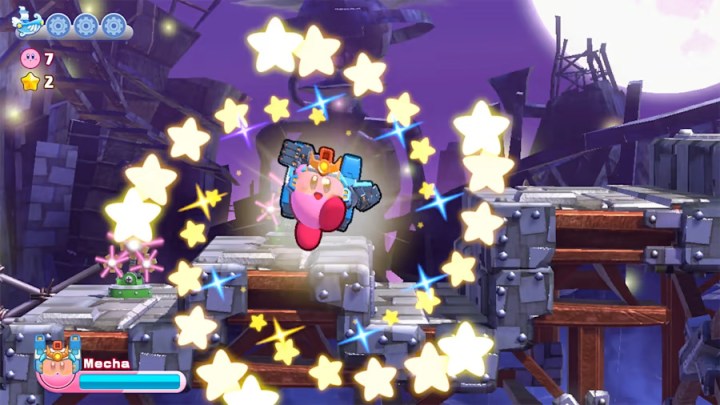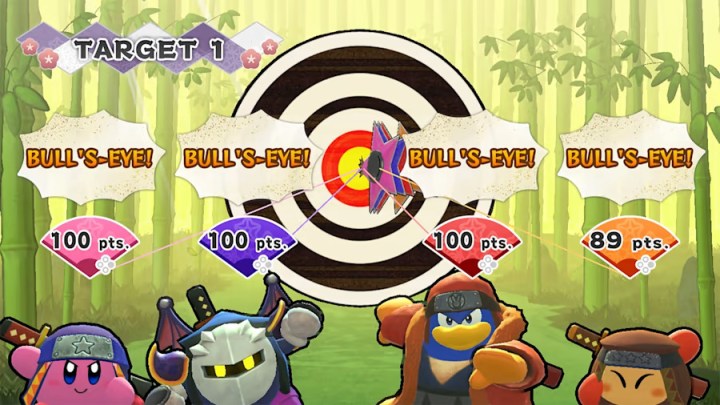Nintendo has a tricky task on its hand with Kirby’s Return to Dream Land Deluxe. The upcoming Nintendo Switch release revives a 2011 Kirby entry that was liked well enough by fans at the time, but it’ll launch in the shadow of the pink puffball’s best adventure, last year’s transformative Kirby and the Forgotten Land. Though a wave of love for Kirby should help Return to Dream Land get some extra eyes, it’ll need to do a bit more than visually touch up an old platformer to fully capitalize on that success.
The good news is that developer Hal Laboratories seems up to that task. I saw around 30 minutes of gameplay from Kirby’s Return to Dream Land Deluxe, showing off some of the rerelease’s new features. While its core platforming remains unchanged, standing up as a return to form for the series, its enhancements have me excited to dive back into Dream Land — especially once I saw Kirby’s new mech suit in action. Though I’m more interested in some genre experiments here which see Hal testing promising new 2D platforming ideas in a safe package.
Mecha Kirby
Kirby’s Return to Dream Land Deluxe will be familiar whether you’ve played the original version or not. It’s a straightforward 2D Kirby game where players inhale enemies, get copy abilities, and collect a whole bunch of stuff. The added twist during the Wii era was that it featured four-player co-op, which returns here, though that’s not as much of a special selling point in 2023 as it was in 2011. There are some key new additions, though, that should entice Kirby fans back.
For instance, Dream Land Deluxe introduces some new copy abilities to the fold. A brand new sand power will let Kirby blast enemies with sandcastles and dust tornadoes. Though I didn’t see that in action during my demo, I did see what has instantly become my favorite ability in sight alone: Mecha Kirby. Calling back to Kirby’s Planet Robobot days, the puffball gets suited up in Gundam-like armor allowing him to shoot enemies with laser shots. Most copy abilities only give Kirby access to a few basic attacks, but Mecha is an entirely different game. I counted five pages worth of attacks listed in a menu, giving him nearly 20 moves in one ability.

During the demo, I’d see him shoot some basic blast forward, arc missiles upwards at an enemy, punch a boss with his fists, and unleash charge shots that change depending on how long the attack button is held down. All of that almost transforms the platformer into a different mech platformer self-contained within one ability. It’s an exciting change, one that I hope means Hal is committed to making 2D Kirby games more mechanically complex going forwards.
Aside from that, updates to the core adventure seem light. For younger players, there’s a new assist mode that’ll keep players from falling down pits, double their health, and give them copy abilities during boss fights when needed. That should help make Dream Land Deluxe a good option for any parents who want to introduce their young kids to another Kirby game post-Forgotten Land.
Zero mission
Outside of the main story, Dream Land Deluxe is expanding the relatively short original game with some new content. Merry Magoland is a new hub that houses 10 multiplayer minigames from the Kirby series, including two brand-new ones. It’s a mini party-game mode where players can earn stamps for completing challenges and buy cosmetic masks. That gives the package an extra boost of multiplayer potential even if it likely won’t replace Mario Party.

The main draw of the package, however, is Magolor Epilogue. The brand new story mode is a total departure from the regular Kirby formula, in a way that almost reminds me of Metroid Zero Mission’s bonus ending. The idea is that players control the campaign’s rival, Magolor, after he’s defeated by Kirby. When the story begins, Magolor has lost all of his powers, save for a single jump and a blast shot. The ultimate goal is to regain all of his powers while navigating a new set of 2D platforming levels. After completing the first level, for instance, Magolor regains the power to drop bombs by pressing down and attack.
The epilogue is much more progression focused than a typical Kirby game. By chaining together combos, players gain magic points that can be spent to buy and upgrade abilities. For instance, some early upgrades extend the range of his blaster or up its fire rate. Considering that Kirby games generally lack too much of a power curve, I’m excited to see how Hal Laboratories can stretch its 2D platforming legs and create a side story that stands on its own.
Kirby’s Return to Dream Land Deluxe will need that help considering that the original game was a brisk six-hour adventure. Magolor Epilogue should extend that, as should the main campaign’s Extra mode, which acts as a harder replay with some remixed levels. Based on what I’ve seen so far, Hal makes a strong case for the double dip here by going the extra mile with new content. Though what I’m most excited about is how it seems that the developer is using the release as a safe way to test new platforming ideas. If Dream Land Deluxe is a tease of what’s to come, we could be in for another reinvention of the series soon.
Kirby’s Return to Dream Land Deluxe launches on February 24 for Nintendo Switch.



